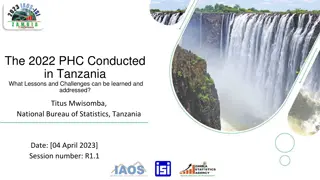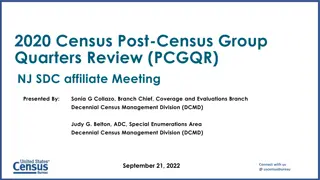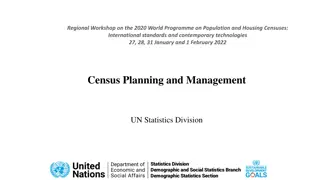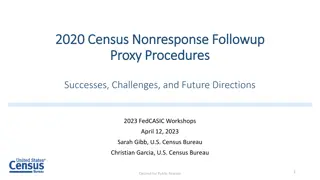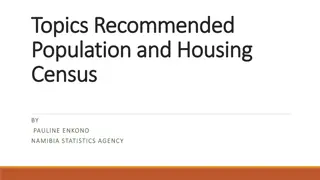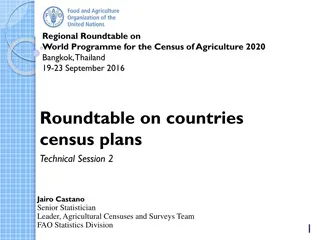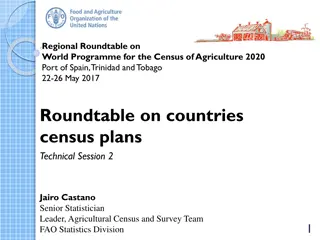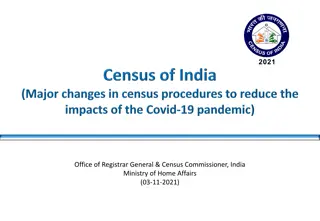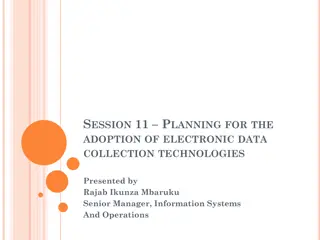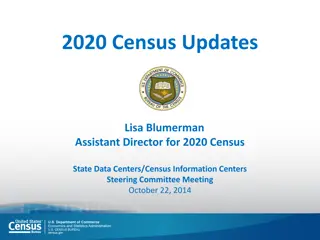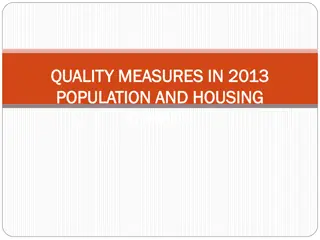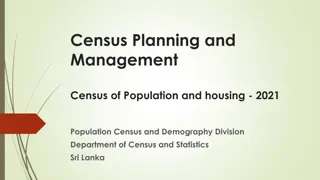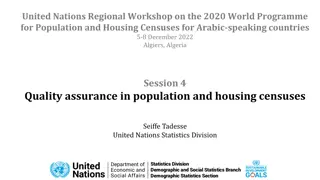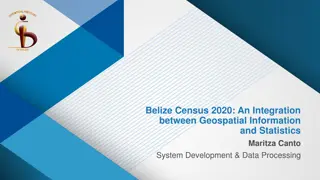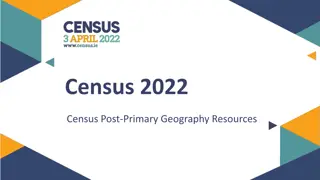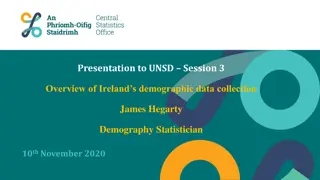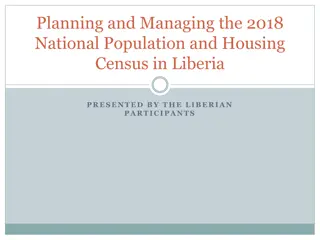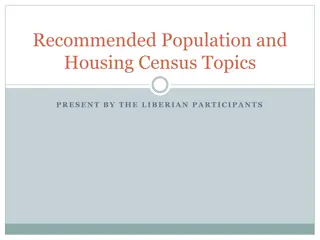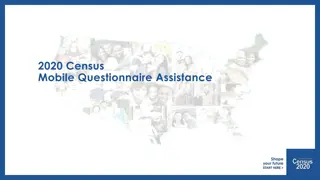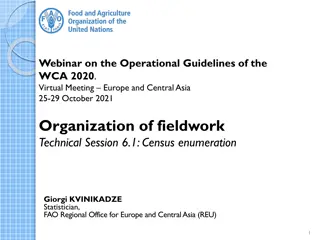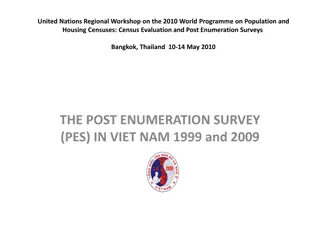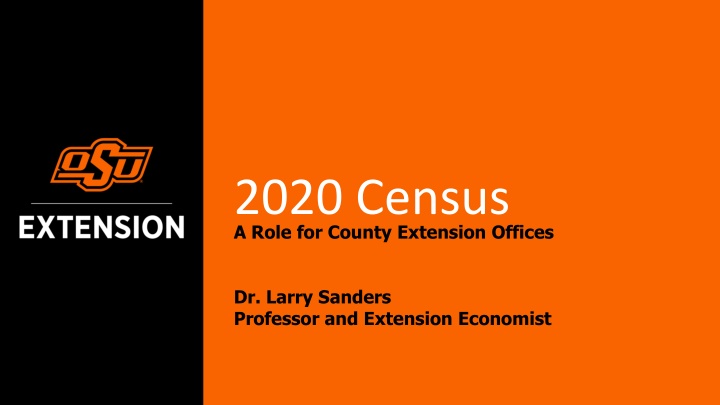
The Vital Role of County Extension Offices in the 2020 Census
Learn about the significance of the 2020 Census, the crucial role of County Extension Offices, and the impact of Census data on federal funding, economic development, and community initiatives. Explore the timeline for the Census process and how it influences decision-making for businesses, governments, and individuals.
Download Presentation

Please find below an Image/Link to download the presentation.
The content on the website is provided AS IS for your information and personal use only. It may not be sold, licensed, or shared on other websites without obtaining consent from the author. If you encounter any issues during the download, it is possible that the publisher has removed the file from their server.
You are allowed to download the files provided on this website for personal or commercial use, subject to the condition that they are used lawfully. All files are the property of their respective owners.
The content on the website is provided AS IS for your information and personal use only. It may not be sold, licensed, or shared on other websites without obtaining consent from the author.
E N D
Presentation Transcript
2020 Census A Role for County Extension Offices Dr. Larry Sanders Professor and Extension Economist
Agenda What is the 2020 Census? What s the key role for Extension? What s in it for Extension? FAQs for Extension FAQs for the Public
2020 CENSUS The US Constitution mandates that a count of every resident be conducted every 10 years. Congressional representation The primary reason for the Census is to reapportion the seats in the House of Representatives Once the number of seats for each state is determined, state officials redraw congressional and state legislative districts More than $675 billion in Federal funding is affected by Census data E.g., schools, hospitals, roads and other infrastructure, social services Each person in OK represents $1,1231 in federal funds 1 George Washington University Institute of Public Policy, https://gwipp.gwu.edu/sites/g/files/zaxdzs2181/f/downloads/IPP-1819-3%20CountingforDollars_OK.pdf
2020 CENSUS Private businesses use Census data to: Locate new stores and factories Identify locations for new homes and residential facilities Census numbers matter when companies consider investment decisions Economic Development Federal funding of state/local projects often based on census count Local governments use Census data for emergency management and public safety Residents and non-profit organizations use Census data for advocacy and community initiatives that impact quality of life Moral obligation: if someone lives in Oklahoma they have a right to be counted Everyone is affected by the Census!
2020 CENSUS TIMELINE March 2020: Census will be mailing postcards and a letter with online and phone instructions to households April 1, 2020: Census Day (where you live on this date is the reference point for Census data) April 2020: Reminder letters and postcards sent to non-respondents May 2020: Census takers begin visiting homes that haven t responded yet December 2020: Counts delivered to the President and Congress By March 31, 2021: Counts delivered to states for redistricting
2020 CENSUS PARTICIPATION Online (Preferred method): Each household will be mailed a unique ID Using the unique ID or home address, a representative of the household can complete the survey using a smartphone, tablet, personal computer or public terminal Phone: Using the unique ID or home address, individuals can call the toll-free Census Service Center to participate Mail: Unless specifically requested, mail surveys will only be sent to addresses identified as unlikely to participate, and to non-responders In-person: If a household has not responded by May, a Census taker will visit your home
2020 CENSUS QUESTIONS 1. How many people are living or staying at your home on April 1, 2020? 2. Is your home owned or rented? 3. What is the sex of each person in your home? 4. What is the age of each person in your home? 5. What is the race of each person in your home? 6. Are any persons in your home of Hispanic, Latino or Spanish origin? 7. How are the persons in your home related?
Whats the key role for Extension?
ADDITIONAL EXTENSION OPPORTUNITIES Form a core Census assistance team in your Extension Office with all educators Contact the Complete Count Committee for your community or county Obtain materials/slides from Dr. Larry Sanders to present an awareness slide show in your area Consider a newspaper column on this subject
WHATS IN IT FOR EXTENSION? An inaccurate population count jeopardizes: Federal formula funding for Extension Funding for services and programs that serve our families, friends, neighbors (e.g., FNEP and SNAP Ed programs; free and reduced lunch & summer lunch programs) Congressional and state legislative representation Rural and minority communities historically have not participated fully in the Census. For 2020, online participation is the primary method for participation, but instructions are being mailed to each household. If there are households in your county without a physical address, they will not receive instructions.
WHATS IN IT FOR EXTENSION? Extension benefits from promoting Census participation by: Reinforcing our reputation as a trusted, science-based source of information Reaching new audiences (e.g., working alongside of local business organizations) Increasing awareness of the county office & its services
FAQs For Extension
FAQs BY EXTENSION 1. Are you asking me to be a Census taker (to go door-to-door and collect data)? NO!!!
FAQs for EXTENSION 2. What are you asking of me as an educator? When appropriate, encourage residents to participate in the Census be looking for instructions, know how to respond and/or get questions answered. Provide a designated computer for residents to use for Census participation De-mythify rumors about the Census through existing communication channels (e.g., monthly newsletter or social media) Consider participating in your community s or county s Complete Count Committee (find yours here: https://www.census.gov/library/visualizations/interactive/2020-complete- count-committees.html)
FAQs for EXTENSION 3, What are you asking of me as an educator? (continued) Post posters in your office and have handouts available (available here: https://2020census.gov/en/partners/outreach-materials.html) Share handouts in areas with anticipated low responses (identify these here: https://www.census.gov/roam)
FAQs For the Public
FAQs for the PUBLIC 1. Are non-citizens counted in the census? YES. Everyone counts. The 2020 Census counts everyone living in the country, including non-citizens. 2. Can my answers be shared with law enforcement or used against me? NO. The law prevents the Census Bureau from sharing your information with law enforcement. Your answers cannot be used to impact your eligibility for government benefits. Your answers are only used to create statistics about our country. The Census Bureau is bound by Title 13 of the U.S. Code to protect your personal information and keep it strictly confidential. That s every answer, to every question. 3. Can I only take the census online? NO. The 2020 Census will be available online, by phone, and by mail. Online and phone responses can be completed in 13 languages (English, Spanish, Chinese, Vietnamese, Korean, Russian, Arabic, Tagalog, Polish, French, Haitian, Creole, Portuguese, and Japanese). A paper form will be mailed to every house that hasn t responded already when we send our fourth mail piece out. 4. What won t the Census ask for? The census will never ask for Social Security numbers, bank or credit card numbers, money or donations, or anything related to political parties.
FAQs for the PUBLIC 5. Does the 2020 Census impact me? YES. The 2020 Census is vital for communities across the United States. Your response shapes decisions about how public funds are spent for things like schools, fire and emergency services, and health care clinics for your community as well as your congressional representation. 6. Who counts as part of your home? If you are filling out the census for your home, you should count everyone who is living there as of April 1, 2020. This includes anyone who is living and sleeping there most of the time. If someone is staying in your home on April 1, and has no usual home elsewhere, you should count them in your response to the 2020 Census. 7. Is my information safe? Your responses to the 2020 Census are safe, secure, and protected by federal law. Your answers can only be used to produce statistics. They cannot be used against you by any government agency or court in any way not by the FBI, not by the CIA, not by the DHS, and not by ICE.
FAQs for the PUBLIC 8. Once I identify my rural household to the Census Bureau, how will I receive my Census information? After you have called in to request a unique I.D. if one did not get to your physical location, you should check your physical mail box or doors for delivery. IT WILL NOT AND SHOULD NOT SHOW UP IN YOUR PO BOX. IF NOT RECEIVED, CALL TO REQUEST MAILING TO PHYSICAL ADDRESS.
FAQs for the PUBLIC 9. What is race ? The Census Bureau defines race as a person s self-identification with one or more social groups. An individual can report as White, Black or African American, Asian, American Indian and Alaska Native, Native Hawaiian and Other Pacific Islander, or some other race. Survey respondents may report multiple races.
FAQs for the PUBLIC What is ethnicity ? 10. Ethnicity determines whether a person is of Hispanic origin or not. For this reason, ethnicity is broken out in two categories, Hispanic or Latino and Not Hispanic or Latino. Hispanics may report as any race. Again, the Census Bureau adheres to strict confidentiality laws that prohibit sharing of respondent information. They do not share respondent answers with immigration, law enforcement, tax collection agencies or any other organization.
FAQs for the PUBLIC 11. How does the Census keep my information safe? The Census Bureau is bound by Title 13 of the U.S. Code to keep your information confidential. Employees at the Census Bureau take a life-long oath to protect your personal information. Under Title 13, the Census Bureau cannot release any identifiable information about you, your home, or your business, even to law enforcement agencies. The law ensures that your private data is protected and that your answers cannot be used against you by any government agency or court. Strict policies and statistical safeguards help protect the confidentiality of your information. Before releasing data products, the Census Bureau verifies that they meet its confidentiality standards. From the beginning of the data collection process, the Census Bureau follows industry best practices and federal requirements to protect your data. The security of Census Bureau systems is a top priority, and our IT infrastructure is designed to defend against and contain cyberthreats. We continually refine our approach to identifying, preventing, detecting, and responding to these threats.
FAQs for the PUBLIC 12. Will the count be for 2020 only? No. The count associated with the 2020 Census will not affect just one year. It will impact the next decade. The Census will serve as the base year for population estimates from 2021-2029. Federal Funding, economic development & representation will all be affected over the coming decade by the 2020 Census just as the 2010 Census count is still impacting us now.
FAQs for the PUBLIC How can I get more information, or ask questions, 13. about the 2020 Census? Online: 2020census.gov Phone: 800-923-8282 or 972-510-1800
Larry Sanders Department of Agricultural Economics O | 405.744.9822 E | larry.sanders@okstate.edu 509 Ag Hall Agecon.okstate.edu Census URL: http://www.agecon.okstate.edu/agpolicy/census.asp

